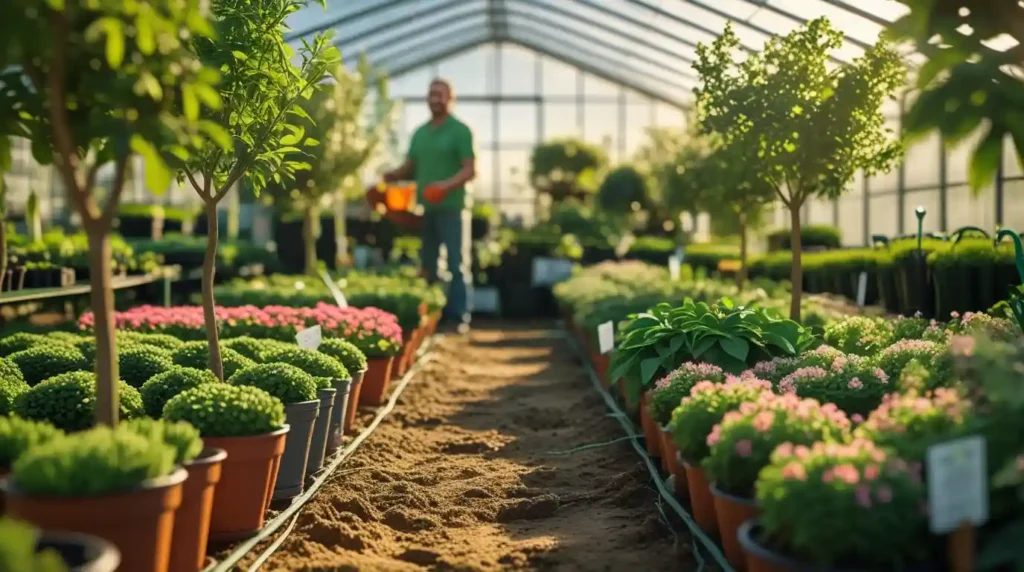Introduction to Plant Nursery Business
A plant nursery isn’t an outlet to purchase plants. It’s an incredibly profitable company that is responsible for beautification, sustainability and agriculture. If you’re a gardener or an entrepreneur in search of an environmentally friendly venture, beginning the plant nursery may be a lucrative and rewarding business.
In this thorough guide, we’ll go over all you must be aware of when it comes to creating and managing an effective nursery, from selecting the ideal location to implementing strategies for marketing that will draw loyal customers.
Why Start a Plant Nursery?
The demand for plants has exploded in recent years due to the growing awareness of sustainability, gardening at home as well as urban landscaping. This is why a nursery for plants is a good business concept:
- High Demand : Homeowners, landscapers, and businesses constantly seek quality plants.
- Profit Potential : Specialty plants, organic varieties, and rare species fetch premium prices.
- Environmental Impact : Nurseries promote biodiversity and reduce carbon footprints.
- Scalability : You can start small and expand as your business grows.
Types of Plant Nurseries
Before diving in, decide which type of nursery suits your goals:
1. Retail Plant Nursery
- Sells directly to consumers.
- Ideal for home gardeners and small-scale buyers.
- Requires a customer-friendly location.
2. Wholesale Plant Nursery
- Supplies plants to retailers, landscapers, and municipalities.
- Needs large-scale production and bulk sales strategies.
3. Specialty Plant Nursery
- Focuses on rare, Unique, or organic plants.
- Attracts niche markets willing to pay higher prices.
4. Online Plant Nursery
- Sells plants via e-commerce platforms.
- Reduces overhead costs but requires strong logistics.
Essential Steps to Start a Plant Nursery
1. Conduct Market Research
- Identify local demand (ornamental plants, fruit trees, medicinal herbs).
- Analyze competitors and pricing strategies.
2. Choose the Right Location
- Ensure proper sunlight, water supply, and soil quality.
- Opt for accessibility if running a retail nursery.
3. Secure Necessary Permits and Licenses
- Check local regulations for agricultural businesses.
- Obtain a nursery license, tax ID, and zoning permits.
4. Plan Your Plant Nursery Layout
- Designate areas for propagation, potting, and display.
- Install greenhouses or shade nets for climate control.
5. Select High-Quality Plants
- Source disease-resistant and fast-growing varieties.
- Partner with trusted suppliers for seeds and saplings.
6. Invest in Proper Equipment
- Essential tools: pots, trays, pruning shears, irrigation systems.
- Consider automation for watering and fertilization.
7. Hire Skilled Staff (If Needed)
- Employ knowledgeable workers for plant care and customer service.
- Train staff in pest control and plant health management.
Best Plants to Grow in a Plant Nursery
Choosing the right plants ensures profitability. Here are some top picks:
1. Ornamental Plants
- Roses, marigolds, and hibiscus (high demand for landscaping).
2. Fruit Trees and Berry Plants
- Mango, citrus, and blueberries (popular among home gardeners).
3. Indoor Houseplants
- Snake plants, pothos, and monsteras (trending in urban homes).
4. Medicinal and Herbal Plants
- Aloe vera, tulsi, and mint (used in Ayurveda and wellness products).
5. Unique and Rare Plants
- Bonsai, orchids, and carnivorous plants (attract collectors).
Effective Plant Nursery Management Tips
Running a nursery requires consistent care and smart strategies:
1. Maintain Optimal Growing Conditions
- Monitor soil pH, moisture, and sunlight exposure.
- Use organic fertilizers and pest control methods.
2. Implement Efficient Watering Systems
- Drip irrigation saves water and ensures even distribution.
- Avoid overwatering to prevent root diseases.
3. Keep Pests and Diseases Under Control
- Regularly inspect plants for infestations.
- Use neem oil or biological pest control solutions.
4. Rotate Stock for Freshness
- Sell older plants first to maintain quality.
- Introduce seasonal varieties to keep inventory fresh.
5. Provide Excellent Customer Service
- Educate buyers on plant care with guides or workshops.
- Offer warranties or replacements for damaged plants.
Marketing Strategies for Your Plant Nursery
A great nursery needs visibility. Try these proven marketing tactics:
1. Build a Professional Website
- Showcase your plant inventory with high-quality images.
- Add an e-commerce option for online sales.
2. Leverage Social Media
- Share gardening tips, behind-the-scenes content, and promotions.
- Use Instagram and Pinterest for visual appeal.
3. Collaborate with Landscapers and Garden Centers
- Offer bulk discounts to attract B2B clients.
- Partner with local florists and event planners.
4. Host Workshops and Events
- Teach gardening classes to engage the community.
- Organize seasonal plant sales or festivals.
5. Implement SEO for Online Visibility
- Optimize your website with keywords like “plant nursery near me.”
- Publish blog posts on plant care and gardening trends.
Challenges in Running a Plant Nursery
Every business has hurdles. Here’s how to overcome common challenges:
1. Seasonal Demand Fluctuations
- Diversify with indoor plants and holiday-themed offerings.
2. High Initial Investment
- Start small and reinvest profits for gradual expansion.
3. Weather and Climate Risks
- Use greenhouses to protect plants from extreme conditions.
4. Competition from Big Retailers
- Differentiate with unique plant varieties and personalized service.
Future Trends in the Plant Nursery Industry
Stay ahead with these emerging trends:
- Sustainable Gardening – More customers prefer eco-friendly plants.
- Smart Nurseries – IoT-based monitoring for soil and climate.
- Vertical Gardening – Space-saving solutions for urban buyers.
Final Thoughts: Is a Plant Nursery Right for You?
A nursery for plants is a profitable business that is a perfect blend of passion and profits. With the proper planning, top quality plants and an effective selling, you will establish an enviable nursery that will grow with your customers’ gardens.
Are you ready to get digging? Begin small, be consistent and watch your garden flourish!
FAQs About Plant Nurseries
Q1. How much does it cost to start a plant nursery?
- Small-scale: 5,000–5,000–20,000 | Large-scale: $50,000+
Q2. What is the most profitable plant to grow?
- Specialty plants like orchids, bonsai, and Unique succulents.
Q3. Do I need gardening experience to run a plant nursery?
- While helpful, you can hire experts or learn through courses.
Q4. How do I attract customers to my plant nursery?
- Use social media, local ads, and community events.
Q5. Can I run a plant nursery from home?
- Yes, starting in a backyard or greenhouse is cost-effective.
By following this guide, you’ll be well on your way to establishing a successful plant nursery that stands out in the market. Happy planting! 🌱

